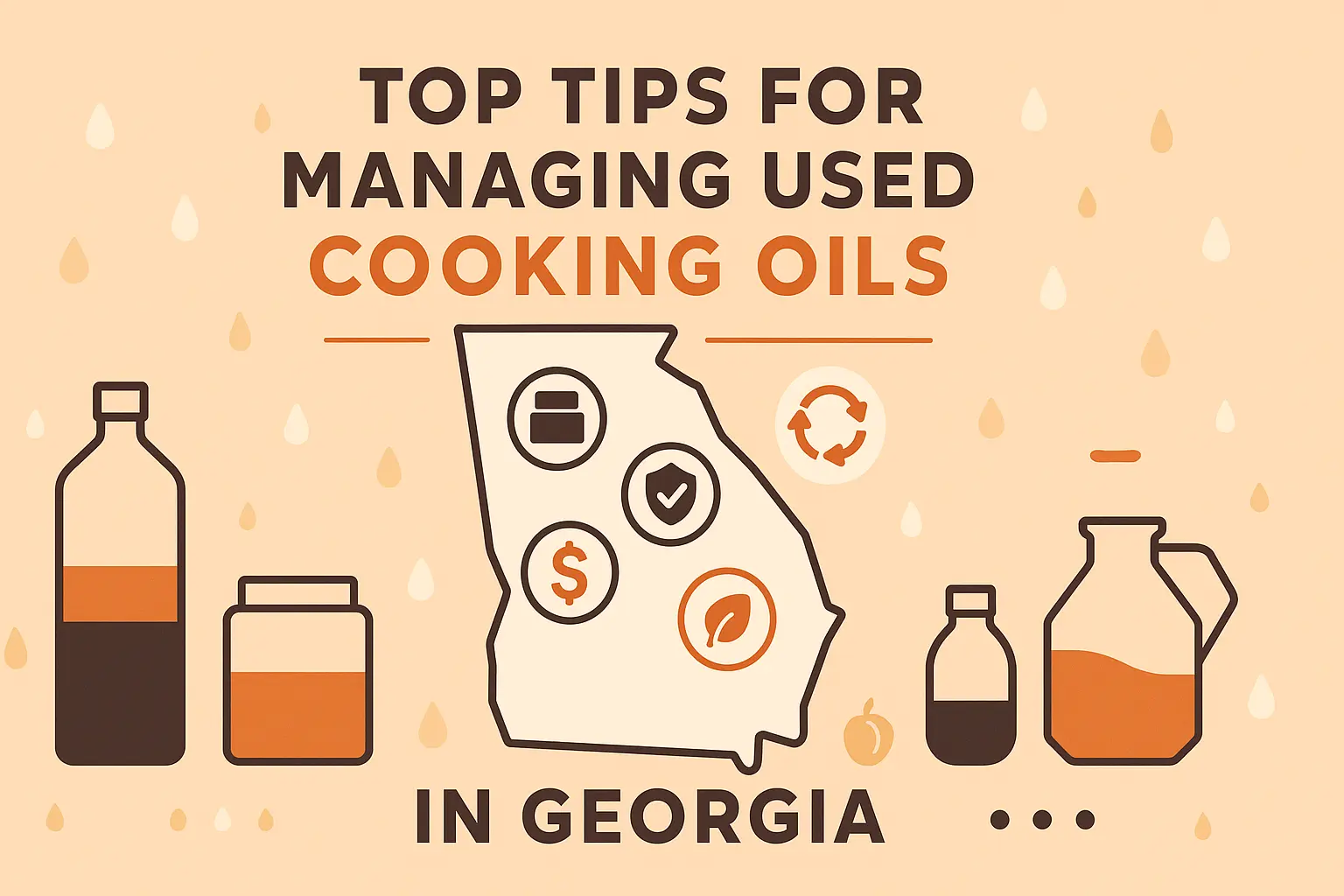Not sure what to do with used cooking oils? This guide will explain how to reuse, recycle, and dispose of them safely and responsibly.
Key Takeaways
- Used cooking oils can be responsibly reused, recycled, or disposed of to prevent environmental harm and improve sustainability.
- Proper reuse involves filtering and storing oil carefully to maintain quality, while recycling turns waste into renewable products, reducing greenhouse gas emissions.
- Improper disposal of used cooking oil can result in significant environmental and economic issues, highlighting the importance of following appropriate disposal methods and using local drop-off sites.
What Are Used Cooking Oils?
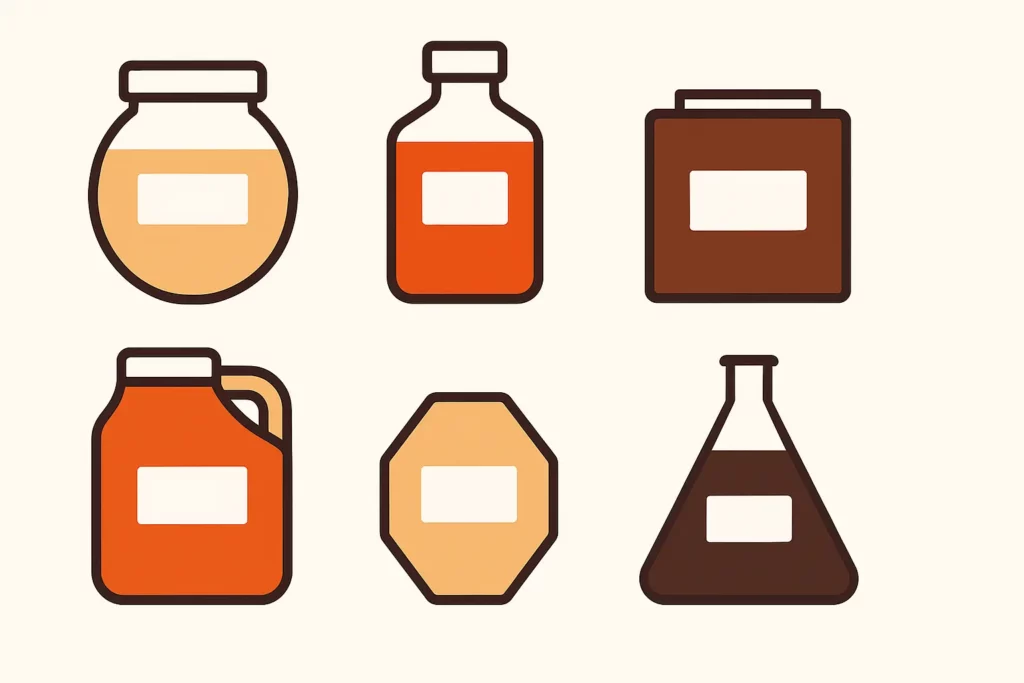
Used cooking oils are essentially oils that have been employed in the cooking or frying of food, losing their pristine quality in the process. Common sources include restaurants, food industry factories, and households, all contributing to a significant volume of waste cooking oil. Used cooking oils are a major component of food waste, and if not managed properly, they can contribute to environmental challenges such as pollution and fatbergs.
Proper management of these oils safeguards the environment by preventing them from entering the waste stream and causing harm. Used cooking oils often contain residual fat, which can cause environmental harm if not disposed of correctly. Knowing the sources and nature of used cooking oils is the initial step in their effective management.
How to Reuse Used Cooking Oil Safely
Reusing cooking oil and vegetable oil can save money and benefit the environment when done safely. Always allow the oil to cool in the pan before transferring it for reuse or disposal. Strain the frying oil through a cloth or sieve to soak out food particles, which can degrade the oil and affect food quality. Any remaining grease in the pan can be wiped with a paper towel or paper towels before washing.
To properly handle and reuse oil:
- Make sure the oil is fully cooled before handling or storing.
- Keep the filtered oil in a sealed, opaque container with a lid to shield it from light and air, preventing rancidity and avoiding spills or odors.
- Reused oil can be stored for up to several weeks if kept in a sealed container.
- Gradually heat the oil.
- Consider adding fresh oil to maintain its quality during fry.
Clean dishes thoroughly to remove any residual oil and prevent plumbing issues.
This approach reduces waste and saves money over time.
While reusing oil has benefits, it requires careful handling to ensure food safety and quality, as improper practices can be dangerous. Storing properly and heating gradually are key steps in this process.
Recycling Used Cooking Oil: Steps and Benefits
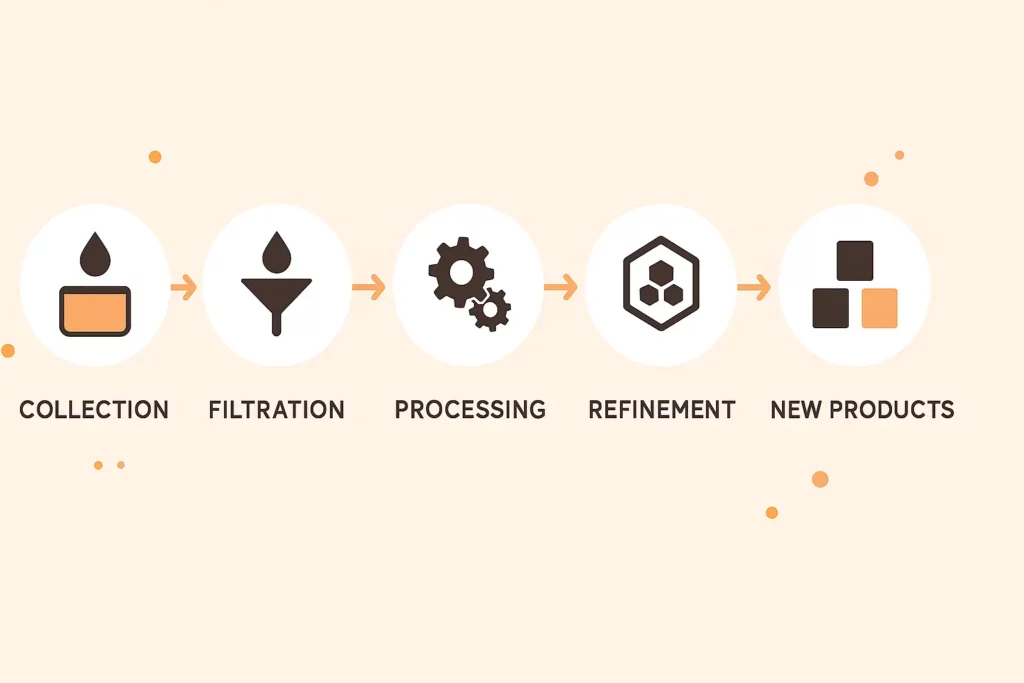
Recycling used cooking oil transforms waste into a valuable resource. Specialized equipment is used to collect cooking oil from various sources, ensuring safe and efficient handling. The collected oil is often transported to a recycling center for further processing. The chemical conversion process starts with filtering, refining, and purifying the waste oil to eliminate impurities. Refineries then convert this cleaned oil into a variety of renewable products, including biofuels, animal feed, cosmetics, and soaps. Animal feed made from recycled oil retains valuable nutrition for livestock and pets.
A major benefit of recycling used cooking oil is its positive environmental impact over the entire life cycle of the product. Converting waste cooking oil into biodiesel reduces reliance on fossil fuels and lowers greenhouse gas emissions. Many restaurants are converting their waste cooking oils into biofuels, showcasing the practical applications of this sustainable practice. Biofuels like renewable diesel and sustainable aviation fuel highlight the versatility and potential of recycled cooking oil.
In Georgia, recycled cooking oil is converted into clean biodiesel that powers local school buses, demonstrating a practical application. Recycling used cooking oil offers environmental and economic benefits, including reducing waste management costs and providing sustainable fuel.
Proper Disposal Methods for Used Cooking Oil
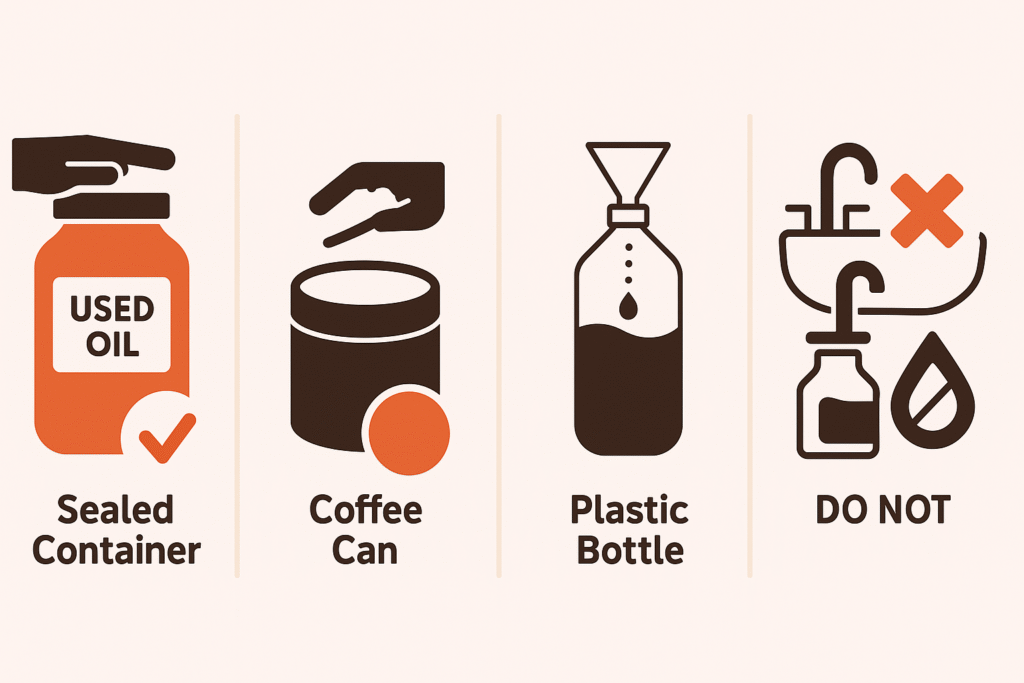
Proper disposal of used cooking oil prevents environmental and safety hazards. Never pour hot oil into plastic containers, as it can melt the plastic and cause spills. While oil is a liquid when hot, it cools and solidifies, which can clog pipes and lead to blockages. Always let oil cool completely before disposal.
Oil should never be thrown down the drain, garbage disposal, or toilet, as it can cause severe plumbing and environmental issues. FOG (fats, oils, and greases) can build up in plumbing and sewer systems, leading to backups and costly repairs. Never pour cooking oil down the drain, as improperly thrown oil can also harm the environment.
To rid your home of leftover oil safely, you can mix used oil with absorbent materials like sawdust or cat litter to help it solidify, making it easier to throw in the trash. Cooled oil can be thrown in the trash if it is properly contained in a sealed container and placed in a trash can. Alternatively, cool, funnel, and drop the oil at Household Hazardous Waste sites for safe processing. Cooking oil that has been used can also be put in the trash after it is cooled and secured in a container.
Check local disposal regulations, as guidelines can vary by location. In areas without specific drop-off sites, contact local fire departments to see if they accept used cooking oil.
The Environmental Impact of Improper Disposal
Improper disposal of used cooking oils causes severe environmental issues like sewage blockages and contamination. When oil is poured down the drain, it sticks to the inside of kitchen pipes, leading to buildup and blockages that hinder water flow and cause costly plumbing repairs. The accumulation of cooking oil in sewers can lead to fatbergs, which result in expensive damage and maintenance costs. Some people try to use hot water to wash away grease, but this does not prevent fats, oils, and grease from solidifying and accumulating inside kitchen pipes over time. This practice can also degrade water quality by allowing pollutants to enter local waterways.
Clogged sink caused by grease have resulted in over $30 million in costs in the United States alone. Pouring bacon grease down the drain can block sinks, causing slow drainage, gurgling noises, and bad smells.
Recycling and properly disposing of cooking oil alleviate these environmental and economic burdens. Keeping grease and food waste out of drains and landfills contributes to a cleaner, safer environment and helps protect water quality. Sewage treatment systems are not equipped to handle the fats, oils, and greases that accumulate from cooking oil, making proper disposal even more critical.
Commercial Solutions for Used Cooking Oil Management
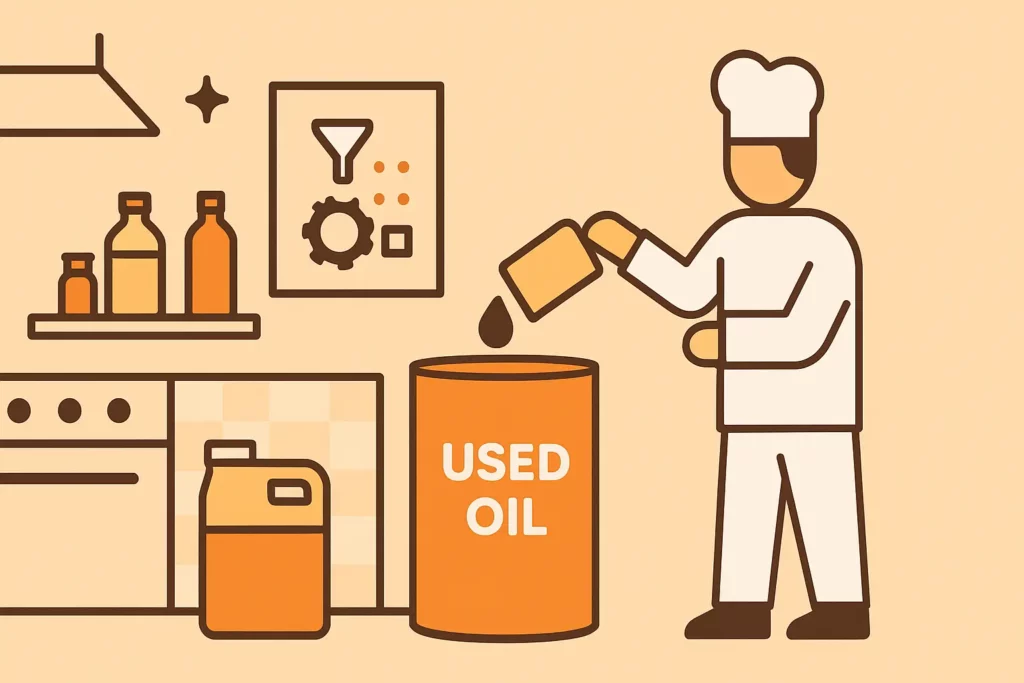
Commercial kitchens and food service providers require specialized management for used cooking oil. Proper maintenance of the fryer and responsible oil disposal are essential for efficient food preparation and oil management. Many restaurants accept used cooking oil for proper disposal, effectively managing waste and improving food quality.
Professional oil disposal services offer tailored solutions for various types of food establishments. These services include collection and transportation of used oil using specialized trucks, ensuring compliance with environmental regulations and preventing fines. Proper oil management not only supports environmental responsibility but also helps improve customer satisfaction and enhances brand reputation. Restaurants are converting used cooking oils into biofuels to generate power, further contributing to sustainability efforts.
In Georgia, Grease Connections offers commercial pickups and a state-licensed hauler service, simplifying responsible management of used cooking oil for businesses. Using reliable services enhances operational efficiency and supports environmental sustainability.
Local Drop-Off Sites for Used Cooking Oil
Communities often provide designated drop-off locations for used cooking oil, especially during the holiday season when oil usage increases. These sites enable residents to safely dispose of used oil, promoting recycling and environmental responsibility. Many North Carolina communities have FOG programs and are successfully collecting used cooking oil, setting an example for other regions.
For example, Cobb County’s primary drop-off site is the Transfer Station, open Monday to Friday from 7 A.M. to 5 P.M. and Saturday from 9 A.M. to 4 P.M. Fulton County residents can visit CHaRM Atlanta by appointment on specific days. These facilities ensure proper processing of used cooking oil, preventing environmental harm.
Using local drop-off sites benefits the environment while fostering community responsibility and sustainability.
Ensuring Sustainability in Used Cooking Oil Collection
Many organizations prioritize sustainable sourcing of old cooking oils to ensure compliance with quality and environmental standards. Professional collecting services prevent overflow in storage containers and ensure regular pickups.
Adhering to sustainable practices reduces the environmental impact of old cooking oils and supports a circular economy.
Tips for Reducing Cooking Oil Usage
Reducing cooking oil usage promotes health and minimizes waste. Using non-stick cookware, which requires significantly less oil, is one effective strategy. Incorporating steaming or baking methods into your meals can reduce reliance on frying, which typically uses more oil. Used cooking oil can also act as an effective ant poison, providing an additional use for this resource.
Measuring oil instead of pour it directly helps control the quantity used in recipes, promoting healthier and more sustainable cooking. Substituting oil with broth, vinegar, or citrus juice enhances flavor while reducing oil consumption.
Opting for smaller portions is another way to minimize overall oil use. Adopting these tips allows you to enjoy delicious meal while being mindful of your oil usage and its environmental impact.
Future Potential of Used Cooking Oils
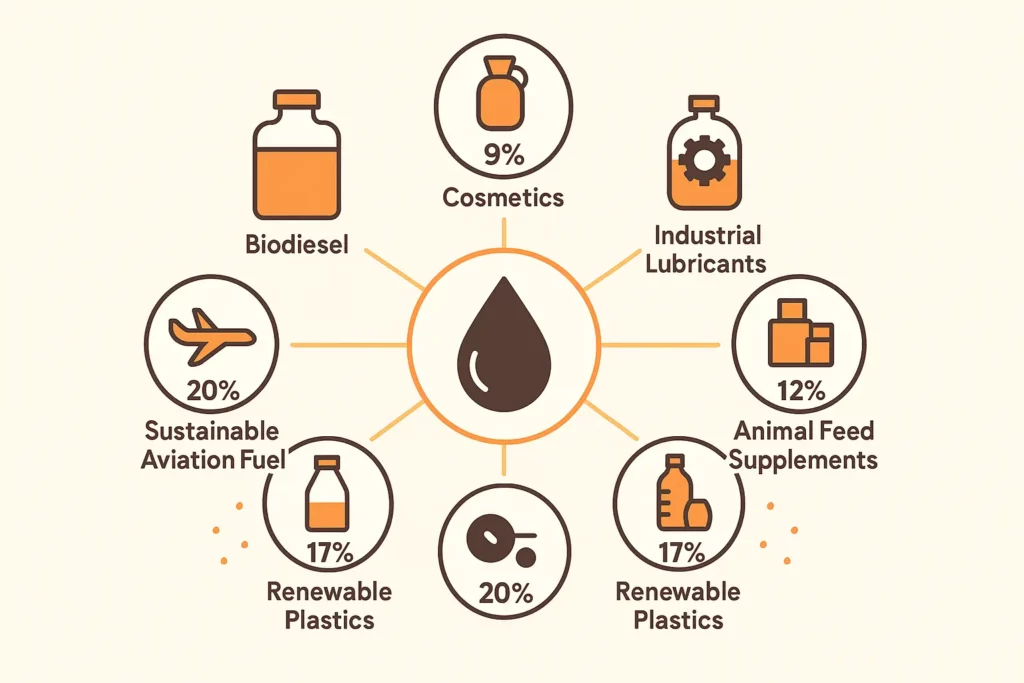
The potential for used cooking oils is vast and promising. Used cooking oil generates methane, a potent greenhouse gas contributing significantly to climate change, when disposed of in landfills. Recycling used cooking oil into renewable fuels drastically reduces air pollution compared to traditional petroleum fuels. Additionally, old cooking oil can be repurposed for emergency lamps during power outages, showcasing its versatility.
Innovations like converting cooking oils into renewable fuel and sustainable aviation fuel at airports highlight the resource’s versatility and potential. Supporting a sustainable, circular economy through used cooking oils is essential for a greener future.
With growth potential in household and untapped regions, the future looks bright for this valuable resource.
Summary
In summary, managing oils through safe reuse, recycling, and proper disposal is essential for environmental sustainability. By understanding the different methods and benefits, we can make informed decisions that positively impact our planet.
As we move forward, let’s commit to implementing these practices in our daily lives and encourage others to do the same. Together, we can turn what was once waste into a valuable resource, paving the way for a greener, more sustainable future.

